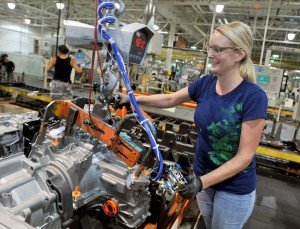
Auto suppliers are concerned about their near-term prospects due to Trump administration trade policies.
The near-term outlook among both large and small automotive suppliers is growing more pessimistic, according to a new survey.
Despite a relatively strong sales and production environment, the darker outlook prevails due to trade policy uncertainty across the automotive supply base in the third quarter of 2018.
The OESA Automotive Supplier Barometer, a quarterly survey of executives at North American automotive suppliers on their 12-month outlook, posted a negative reading of 43 for the third quarter of 2018, seven points below a neutral level of 50.
Even with strong economic fundamentals, such as low unemployment, high consumer confidence and robust vehicle sales, the Supplier Barometer Index or SBI for the third quarter of 2018 reflects negative repercussions from the Trump administration’s current trade policy agenda.
(Automakers warn Trump administration about tariffs. Click Here for the story.)
The latest OESA SBI reading dropped ten points from the second quarter of 2018 result, in sharp contrast to the positive levels of 57 and 53 in the first and second quarters of 2018, respectively.
“Policy uncertainty serves to constrain additional capacity investment and accelerate volatility through the supply chain, adding risk down the tiers,” said Mike Jackson, OESA’s executive director of Strategy and Research and author of the study.
“Now, more than ever, suppliers should strive to use the increasing market turbulence to their advantage by assessing and prioritizing alternative scenarios beyond the near-term to realize their strategy for success,” Jackson added.
(Click Here to see why three quarters of Americans are afraid to ride in autonomous cars.)
Concerns also remain about supply chain risks, commodity prices, the impact of Section 232 and Section 301 tariffs, as well as the fate of stalled NAFTA negotiations in the context of midterm congressional elections.
Each concern adds uncertainty to the planning environment, causing automakers and suppliers to reassess, revise and potentially postpone incremental investments until greater clarity can be determined.
Supplier executive responses reflect a universal increase in pessimism about prior quarter survey results. Some 38% of responses from smaller, more regionally-focused suppliers, reflect increasing pessimism, twice the rate compared to the prior quarter.
(To see more about how millennials are propping up the auto industry, Click Here.)
Even more dramatic, 75% of executive responses from larger suppliers, with revenue between $500 million and $1 billion, show a sharp increase in pessimism, up from 38% in 2Q 2018, the OESA study found.

